Natural Disaster (Book 3): Storm Read online
Page 14
“No. I’ve been with my husband at the care facility—you know the nursing home by the high school?” she said. “I just came out here a few minutes ago, trying to figure out how I can help.”
“So the nursing home came through okay?”
“No,” she said. “It was pretty badly hit.”
The man opened his mouth, possibly to ask about her husband, thought better of it, and turned again to watch the rescue operation.
She saw one of the people toss off the blanket and turn to walk out of the light. It was a woman, dust covering her hair. She grabbed a guy by the shirt and spun him around, apparently not pleased with him.
Sherryl recognized him then—it was Greg.
She slipped under the yellow tape and walked toward him, finally recognizing the woman as the new police chief. “Greg,” yelled Sherryl.
They both looked over and Greg pulled away from the woman and came trotting over. Sherryl opened her arms and he came into them, holding on to her. He was muddy. His hand and arm were bandaged.
“I’m so glad you’re okay,” she said, feeling tears threatening.
“Holly,” he said, his voice breaking.
Oh, no. She pushed back to look at him.
“She’s hurt bad, and I can’t get to her.”
“Where is she?”
“I can’t even find that out. A hospital down in Cincinnati, is all I know.”
“We’ll figure it out.”
“How? There aren’t any phones and the cells—”
“We’ll drive down there. My cell phone will start working at some point, as soon as we hit a tower.”
“Your car is okay?”
“Miraculously, yes. The tornado just missed it.”
“I just saw mine. It looks like it’s been through the crusher at the junk yard.”
“And my house is standing.”
“I doubt mine is. Central Elementary was leveled by the second tornado, and my house was in its path.”
“That doesn’t matter. You know you can stay with me.”
“Will you take me down? Now, to Cinci?”
She looked over his shoulder. Someone else was talking with the chief. “Do you need to tell your chief you’re headed out?”
“If I do, she might fire me on the spot. And I can’t afford to lose insurance with Holly in the hospital.”
“You have to tell her that you’re going, don’t you?”
“I’ll radio her in a minute. Let’s get going while we can.”
She pointed in the direction her car was parked. Once there, she opened the trunk and pulled out a bag of Jim’s clothes.
She got in the car and tossed the bag at Greg. “Find something clean to put on.”
“These are Jim’s?”
“He’s dead, Greg.”
“Oh, Sherryl. I’m so sorry.”
“I keep telling myself it’s a blessing.”
“It can’t feel that way, though.”
She shook her head and started the car. “Let’s get going. Unless you want to stop by my house and clean up? Shower probably works, but the electricity is out.”
“No. I want to find my daughter.”
She took them south on Central, which turned into a two-lane highway for a few miles. “Don’t forget to call your boss,” she said.
“Thanks. I had forgotten.” He took out his radio and got the chief on it. The exchange was brusque. He finished by saying, “I’ll be back, I promise. I just need to find her, and I won’t stay long. I’ll be back here before nine tonight, at the latest.” He glanced at Sherryl, who nodded her agreement. She could get him back by then.
When he got off he pulled out his cell phone. “Damn,” he said. “Battery’s dead.”
She said, “My smart phone is in my bag. Take it out and as soon as there’s a signal, start hunting for hospitals online.”
She sped south along the dark highway.
Chapter 14
“We need her insurance information.”
Malika knew better than to volunteer that her family was on MyCare, Ohio’s Medicaid. She wanted treatment as good as any rich person would get—at least until they found her out as a poor person. So she did what she seldom did, and she lied. “I don’t know.”
“It’s fine, don’t worry,” said the ambulance attendant, a dark-haired white woman. “I have to go, but they’ll take good care of you.”
“Thank you for bringing me.” She had been transferred out of the fire truck just south of Fidelity and hadn’t had a chance to thank the firefighters who had rescued her.
“Take care,” the woman said, and left her in the care of a male nurse, who was still writing down what the ambulance woman had been telling her.
“Okay, let’s look at your legs,” he said, finishing his notes. His eyebrows were raised as he lowered the sheet back over her.
That didn’t seem good.
“I’m going to get you into X-ray,” the nurse said.
It happened fast enough that Malika really did start to worry. The last time she’d been in an ER had been with Antoine, and that had taken hours and hours. She must really be in trouble if they were moving this quickly.
In the X-ray lab, they took two shots of both her legs. “We need to turn you on your side,” the attendant said. “I’m afraid it might hurt.”
“I’m doped up,” said Malika. She felt the pain, but distantly, as if it were a tinny, broken-up sensation felt through a cell phone, if a person could feel things through a cell phone. Maybe they’d invent that. That, or the smell phone. Smell phone? She must be pretty high.
The attendant had Malika grab on to the edge of her bed, hold her breath, and took more pictures from that direction. “You may need an MRI before you’re done,” she said. “Ever had one of those?”
“No, ma’am,” Malika said.
“It’s noisy, but it doesn’t hurt a bit,” she said. “You claustrophobic?”
“Not at all.” Though she never wanted to be pinned by a fallen building again.
“That’s good.” She pushed Malika out into the hallway and said, “Someone will be here in a second to take you back.”
Malika’s mind drifted for a while, and then she was on the move again, back to the ER, where a short Indian doctor with a lilting accent examined her.
“What did you do to yourself?” he said.
“I got fell on,” Malika said, and felt her face flush at the bad grammar. “A tornado. The ceiling fell,” she said.
“Ah. One of the tornado traumas. I suspect we’ll be seeing more,” he said, and leaned over to tap something into a computer keyboard. “A specialist will be here in a few minutes. Do you need something for pain?”
“I’m still high from the last shot.”
“Don’t hesitate to ask for more. Any allergies?”
She shook her head.
“What did she have?” The nurse mumbled something. “Morphine, p.r.n,” he said to the male nurse, writing something down, and then he was gone without a “goodbye.”
The nurse stuck a needle into her arm and someone else came and took blood.
Malika felt as if she were on some bizarre tour of the hospital as she was moved yet again, pushed along long hallways, watching fluorescent lighting sweep by overhead, getting taken into a elevator. When she looked over, she realized the person in the elevator with her, pushing her, was someone new, a black man.
“Where are we going?” she asked the stranger.
“Critical care.”
“I don’t feel critical.”
“They’re just being careful,” he said.
Upstairs, she saw two more doctors in quick succession. The first one had her X-rays and examined her legs. “You’re lucky,” he said. “It looks like there’s micro fracture in your right tibia, but it shouldn’t need to be set.”
“I think it’s starting to hurt again,” she said. “Comes and goes.”
He leaned close to her. “Tell me about it. Describe the pain
to me.”
She tried to concentrate through the drug’s fading fuzziness. “At first, it was like fire.”
“When you got pinned?”
“No, I couldn’t feel a thing for a while, then. When they got the roof or whatever off me.”
“Go on.”
She tried to tell him how it had felt then, and how it was different now, less burn-y and more of a throb. He nodded, looking sympathetic. It was easy to talk to him. But talking about the pain seemed to make it hurt more again.
“It’s gotten worse since we’ve been talking?” he said.
She nodded. “Are you going to have to cut my legs off?”
“No, no,” he said, and he patted her arm. “We might do some minor surgery. The damage is to the muscles, maybe to a nerve.”
“Will I walk again?”
“It might take a few weeks, and it’ll hurt at first, but you should be able to walk.”
“Thank you, Jesus,” she said.
“I’ll order you some more pain medication, once we check the time on your last.”
She couldn’t help him on that. She had lost all track of time. Where was Adam? Maybe he was here, but trailing her route through the hospital would be like going on a scavenger hunt.
“My mother and a friend should be coming.”
“We’ll get your mom here, don’t worry.”
He left and was replaced by another doctor, a Chinese woman with a blunt haircut and big round glasses. “I’m the renal specialist,” she said.
“Renal—that’s…” Malika knew what it was, but her mind wasn’t working very well.
“Kidneys.”
“Are my kidneys hurt? I haven’t needed to pee since I got here.”
“It’s complicated, but it has to do with compounds your muscles release in an accident like this. I just wanted to introduce myself in case we have to put you on dialysis in the next couple days.”
“Dialysis?” She knew what that was, but the doctor misunderstood and explained anyway.
“We might have to filter your blood through a machine if your kidneys get overwhelmed with the chemicals your body is producing right now. If it happens, it won’t go on for long. Just until the bad chemicals get cleared out of your system.”
“And I’m making chemicals because of something falling on my legs?”
“Yes.”
“So nothing hurt my kidneys, like the wall falling or whatever?”
“No, they’re uninjured. It’s purely a chemical reaction.”
“That’s interesting.”
The smile came and went so quickly, Malika wasn’t sure she’d seen it. “It is, actually.”
“When will you know?”
“We’re going to test your blood—a lot, every hour today—and we’ll know from that.”
“What are you testing for?”
The doctor studied her. “Potassium, phosphate, myoglobin, creatine,” she said.
“I’ll look those up.”
“You have a smart phone with you?”
“Oh no, I don’t even own a cell phone. I meant, I will when I can get to a computer.”
“Okay,” she said and stood up. She didn’t pat Malika’s arm, which made her the first one. “I’ll see you soon—even if it’s just to tell you everything is okay.”
“Wait. Do you know, are there many people from my town here? Getting treated?” She couldn’t be the only one injured.
“I don’t know, I’m sorry. Bye, now,” the doctor said and went away.
For the first time, Malika realized her whole family could be hurt—or dead. Or Adam’s mom could be. The people in her church, her minister, her teachers. Her debate team. Or anyone at all. She began to worry about each person she knew and cared for.
She didn’t have to worry for long. Another nurse came and added something to her IV, and Malika drifted off into a fuzzier, pain-free world, and then to sleep.
*
When Sherryl’s cell phone approached a working tower, it began to beep at Greg. She had texts and phone messages, more than 25 of them. He told her and offered the phone back.
She shook her head. “Nothing’s as important as finding Holly.”
As he hunted for hospital numbers, Sherryl drove off the two-lane section of highway and onto a newer four-lane stretch, leading into Cinci. It was better lit, with orange sodium lights every hundred feet. She sped up. “Tell me when you know where I’m going.”
“I’m trying to call them in order, starting with the northwestern most.”
It was the third one he tried. “Do you have a child, Holly or NFN Duncan?”
“I’m not able to give out any patient information over the phone.”
“I’m her father, a Fidelity police officer. I left my business card in her clothing. Can you check, please?”
He was put on hold and a few minutes later, the hospital operator came back on line. “Describe the card to me.”
“Fidelity PD, badge on the left, my name, ‘Police Officer’ under that, fax, phone, website.”
“Yes, sir. We have her here.”
“Thank God,” he said. “I’m on my way.” He clicked off and looked up the hospital and got a route to it. The minutes dragged while Sherryl drove to it.
Sherryl let him out in front of the hospital, and he ran inside. He had to stop at a metal detector and show the guard his gun and badge. There was a receptionist at the front wearing a “volunteer” badge. A lot of people were milling around the desk. Greg pulled his badge out of his pocket again, grateful he had it. It was a magical key that could open doors more quickly.
Her looking up the name seemed to take forever. “I have a Greg Duncan listed, in PICU. Third floor.”
“That’s me—her,” he said. “Tell my aunt, please. Sherryl Higgins. She’s parking her car. Let her know where I’ve gone.”
He was three steps away when he realized he didn’t know where he was going. “Elevators?” he called back. The volunteer was on the phone, and she pointed to a wall then motioned to go back.
Greg sped through the hall until he saw the elevator sign and punched the button. After a few seconds, he punched it again, knowing it for the stupidity it was. Keeping his eye on the hall, thinking Sherryl might get here before the elevator, he bounced on his toes, nervous.
No, not nervous. Terrified, to be honest.
With a quiet bing the elevator doors opened and a man with a walker got out. Greg held the door for him and the man nodded his thanks. The doors seemed to hang open forever as he punched the button for the third floor.
It opened on the second floor to let in a hospital worker. When it opened on the third, he hurried out and began scanning the hallways, looking for signs, arrows, a directory, seeing none of that. He pushed through a set of double doors and found a nurse at a station, typing into a computer.
“Excuse me,” he said. “Where is PICU?”
“Oh, it’s in the other wing. Sort of hard to get to. You might want to take the elevator back down and take the other bank up.”
“Can I get there from here, on this floor?”
“It’s complicated,” she said.
“Maybe you could draw me a map?” He wanted to reach across and shake her, or force her to take him there. But he controlled himself. He was close, now, at least, after the awful forty minutes of trying to hunt Holly’s location from the car.
I keep losing her.
It was irrational, he knew, but since the wind had torn her out of his arms, it felt like something was trying to take her away from him—with the ambulance taking her away while his back was turned, and depositing her who-knew-where and now even this.
“Please,” he said. “It’s my daughter.”
She pulled over a pad of paper and drew him a map. Then she explained it to him. Don’t turn at that sign, but at this. If you’re seeing offices, you’ve gone wrong. If you’re in a covered walkway, you’ve gone too far.
He controlled his impatience until she was
done explaining, and then he grabbed the map and took off down the hallways, trying to follow her scrawls and decipher the medical abbreviations. He got turned around once, but he found an orderly to set him straight.
The seconds ticked away, making him crazy with worry. He should have never let Holly out of his sight in the first place. When the wind grabbed at her, he shouldn’t have ever let her go. It was his fault she was hurt.
By the time he got to the PICU, he was panting. No one was at the main nurse’s station. He had to wait. A distant elevator dinged, and before a nurse appeared, his aunt did.
She came up to him and threaded her arm around his waist. “Calm down if you can, Greg. You look like you’re about to have a stroke.”
“I might be.”
A nurse came through swinging doors, pushing a trolley. He said, “Holly Duncan. I’m Greg Duncan, her father.”
“You said they had her down as Greg,” he aunt said.
“Right. There was a business card with her, with my name on it.”
“Can I see some ID?” the nurse asked.
Greg pulled out his wallet for his driver’s license and showed her his badge. The woman said, “Do you have an insurance card?”
“Yes,” he said, digging that out of his wallet.
“Just a second, and I’ll ring for someone to take you in.”
“Just tell me where she is.”
“Let me call a doctor first.”
God, that had to mean bad news. “Is she—?” He couldn’t make himself say the word “dead.”
The nurse seemed to understand and shook her head. “She’s resting. You’ll want someone to answer questions.”
“She’s okay?”
“We’re taking good care of her, Officer. Just give me a second.” She turned her back and picked up a phone, calling someone and speaking in a voice too low to hear.
“I have my phone,” said Sherryl. “You’ll want to call Holly’s mother.”
He had forgotten all about her. “I will when I know what to tell her,” he said.
The swinging doors opened again, and a short pale-skinned man in white stood there. “Mr. Duncan?”
“I’ll wait here,” said Sherryl.
Greg stepped forward with equal parts eagerness to have his eyes on Holly again and trepidation. “Is she okay?”

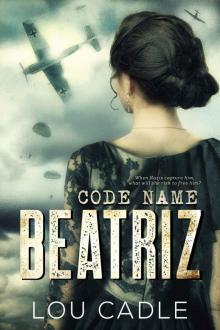 Code Name- Beatriz
Code Name- Beatriz Oil Apocalypse Collection
Oil Apocalypse Collection A Dawn of Mammals Collection
A Dawn of Mammals Collection Killer Pack (Dawn of Mammals Book 4)
Killer Pack (Dawn of Mammals Book 4)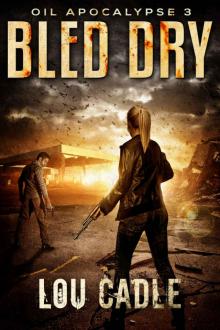 Bled Dry
Bled Dry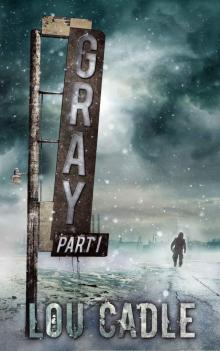 Gray (Book 1)
Gray (Book 1) Dawn of Mammals (Book 4): Killer Pack
Dawn of Mammals (Book 4): Killer Pack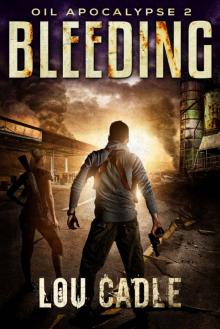 Bleeding (Oil Apocalypse Book 2)
Bleeding (Oil Apocalypse Book 2)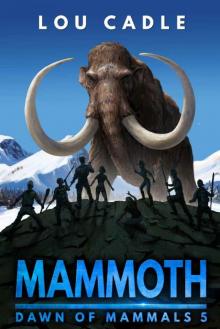 Dawn of Mammals (Book 5): Mammoth
Dawn of Mammals (Book 5): Mammoth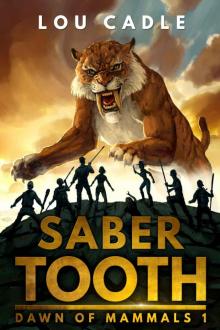 Saber Tooth (Dawn of Mammals Book 1)
Saber Tooth (Dawn of Mammals Book 1)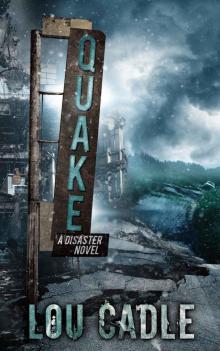 Natural Disaster (Book 2): Quake
Natural Disaster (Book 2): Quake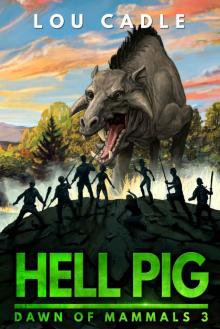 Hell Pig (Dawn of Mammals Book 3)
Hell Pig (Dawn of Mammals Book 3)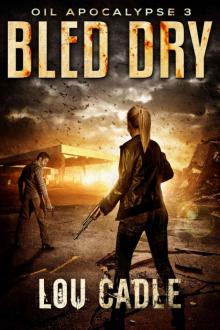 Bled Dry (Oil Apocalypse Book 3)
Bled Dry (Oil Apocalypse Book 3)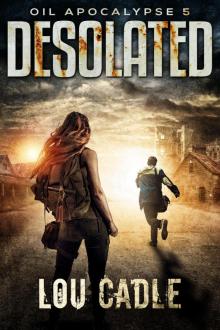 Desolated
Desolated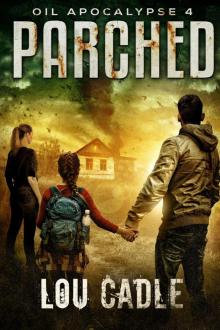 Parched
Parched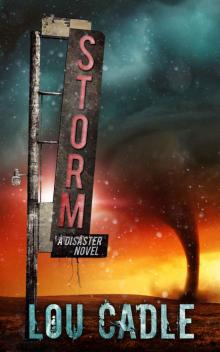 Natural Disaster (Book 3): Storm
Natural Disaster (Book 3): Storm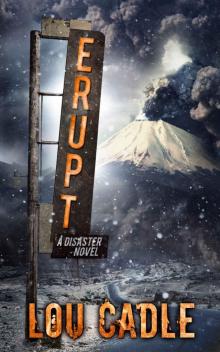 Natural Disaster (Book 1): Erupt
Natural Disaster (Book 1): Erupt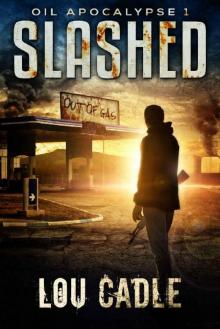 Slashed (Oil Apocalypse Book 1)
Slashed (Oil Apocalypse Book 1)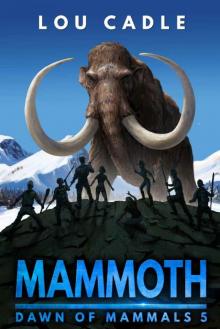 Mammoth (Dawn of Mammals Book 5)
Mammoth (Dawn of Mammals Book 5)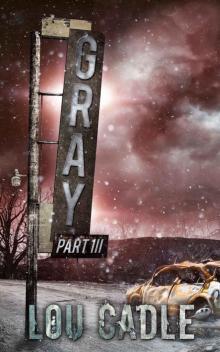 Gray (Book 3)
Gray (Book 3)